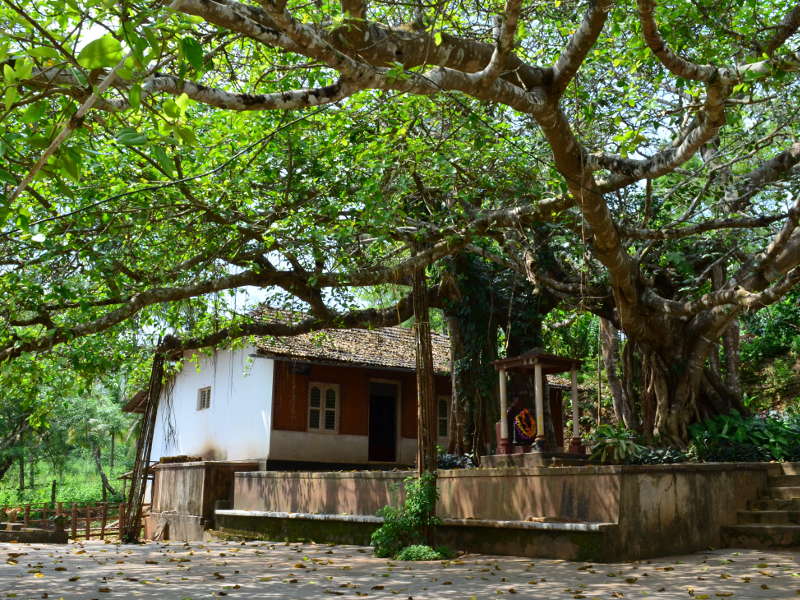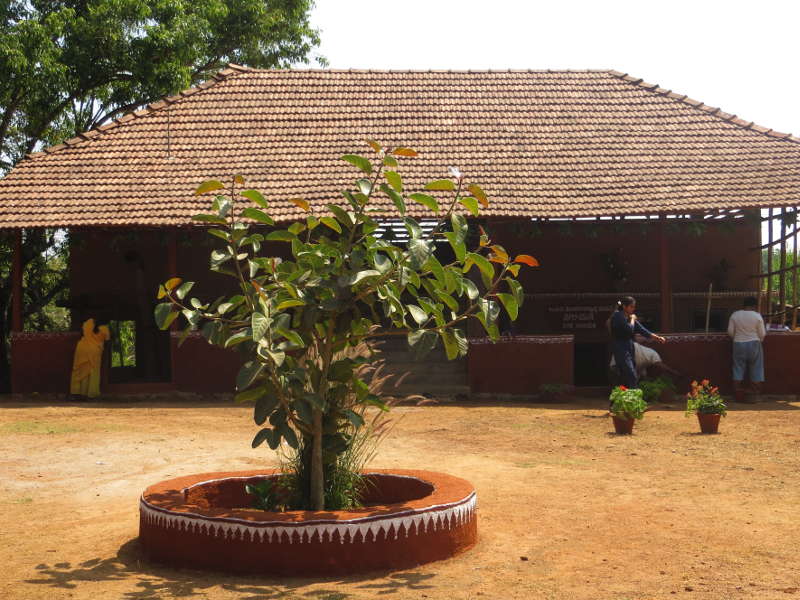ABOUT
ABOUT

Rural Empowerment
Our country still has a large population of farmers, handloom weavers who form the majority of workforce. With sustainable practices in these two sectors, we could improve our chances of facing an impending disaster. Desi strives to make the villages stronger, with an ideal amalgamation of physical labour and progressive thinking and ideals. With promoting sustainable agricultural practices, village industries like handlooms and handicrafts, we could make our villages self sufficient, reduce migration and retain our natural resources. To do this, we have to overcome the barriers of caste discrimination, gender biases and superstitions that are deep rooted in our villages today. India stands at an interesting juncture today with a large population of people still practicing traditional practices which need to be revived and promoted, since they are based on the principles of sustainability.

Women centric
The Charaka collective is formed by local women, is completely run by them and all the women involved are members of this collective. Decentralized units are setup in and around Heggodu for women who find it difficult to travel to Charaka. Most of the raw materials required (natural raw materials used for dyeing) are procured locally.The finished products are sold through Desi outlets all across Karnataka state. The beauty of this whole model is that the women pay themselves the salaries based on the work they accomplish. Emphasis is on the women's all round welfare and not just treating them as workers who take home wages. Every woman is a member of the collective and is directly responsible for the success of the organization. They have internalized the culture of the organization and working here gives them a sense of pride.

Sustainability
Sustainability forms the core of Desi Philosophy. It is committed to environment by ensuring sustainable practices are followed. The Natural dyes are extracted from locally available by products of farming and are available in abundance in the nearby area. Indigo, Pomegranate, Myrobalan, Kasimkari, Arecanut juice, Jack wood and other natural materials are used for dyeing of yarn. The water used for dyeing is treated and reused to water plants. There are no harmful chemicals used in the entire process, thus making this environmentally friendly. The fabric is hand woven and the entire processes uses very less electricity, making this economically viable and sustainable.

Ecological Impact
The current world is moving towards a market economy, with literature, education, society and culture becoming commercialized and leaning towards globalization. With most of our people turning towards western culture and practices, we have lost our connection with our land, with our ancestors, with our tradition. We are caught in a materialistic world, where money rules. Human relationships are dwindling and we are becoming more and more distant from our roots. With extensive industrialization, we have indiscriminately exploited our natural resources, destroyed our forests and polluted our water sources. This has increased our reliance on machines and with peak oil crisis becoming a reality, we are standing at the edge of a massive collapse of our economy leading to huge environmental disasters. With growing consumerism among the people, our society has collectively forgotten our villages, which were once considered our backbones.

Affordability
DESI makes clothes affordable. The profit margins are low and the profits are redistributed to all the members of the community. The pricing of the products are such that it appeals to the middle class urban as well as the consumers in the towns. Before colonization, our country had a rich tradition of Handlooms and it was worn by everyone as everyday wear. Post colonization, with the advent of mills and powerlooms, the handloom weavers lost their livelihood, thereby making the mill clothes more accessible. When handlooms were revived, recently, it is done only in smaller pockets, with high costs, making them elitist and unaffordable the most people. DESI aims to improve accessibility of handloom to a larger population by keeping the designs simple, the entire production in rural areas and reducing the overhead costs. It employs low-skilled and medium-skilled weavers who are the worst affected and producing coarse fabric that can be used for everyday wear.

Simplicity
DESI believes in simplicity, be it in the clothes, the shop ambience or in their administration. The designs are developed by designers who have understood the culture of the people at Charaka and have tailored their designs to suit their abilities without pushing them out of their comfort zone. At the same time, sufficient space is given to the artisans at Charaka to explore their creativity and come up with their own designs. The fabric is simple, coarse and easy to maintain. The dyes used are all of plant origin and are not harmful for our health. The organization is run by people who have been working with Charaka and Desi for a long time and have grown organically to managerial positions. Complex systems like outsourced weaving units across 15 locations is well co-ordinated without having to deploy any software to manage them. There is no hurry for growth; the emphasis is on sustaining the model rather than expansion.
History
Desi Trust was started in 1997 in Bengaluru with the purpose of marketing naturally-dyed handwoven products made by Charaka Womens’ Society in a way that appealed to the urban market. It aimed to build a working relationship with informed and sympathetic patrons from the city. Gradually, it opened outlets all across Karnataka in 15 locations. These DESI outlets sell handloom, handcrafted and food products from across India in addition to Charaka’s products. Over time, the DESI outlet became a lifestyle store for eco-friendly, sustainable choices. The Charaka products are sold under the brand name “Desi”. About 60-70% of Desi’s sales consist of Charaka products.
Apart from creating a market for eco-friendly, handmade products, Desi Trust is involved in other activities in rural areas like providing design interventions to rural artisan groups by linking them with industry experts, improving the quality of their products by upgrading their technical skills, helping them set up exhibitions, extending financial support for training and developmental projects.
Desi Trust consists of eminent personalities in the field of art and design, all honorary members, and also consists of 4 members from the Charaka Society. All key decisions taken by the Trust are in the best interest of Charaka and its artisans.
Sister Organizations
Desi Trust was formed as an extension to Charaka, as a sister organization of Charaka, focused on sales and marketing of Charaka products through its shops across Karnataka. Desi’s focus area is brand building and sale of Charaka naturally dyed handwoven products, while Charaka Society focuses on production and building expertise in the area of natural dyes.
From 2000 till now, Desi Trust and Charaka have always worked hand-in-hand as two separate business entities but with a shared goal and mutual benefits. A considerable portion of the profits made by Desi Trust are redirected back to Charaka Society and in turn to the artisans. At present, Charaka has 60% market share in Desi.
About Charaka


Charaka Womens’ Multipurpose Industrial Co-operative Society was created in the year 1996 with 13 women and two sewing machines and has grown today into a 300+ member strong co-operative Society. It is completely managed by rural women, with board of Directors democratically elected every 3-5 years. Unlike other societies, the board of Directors are also artisans and workers within the co-operative Society. Charaka is a producer organization, focused in production of naturally dyed handwoven fabric and readymade products.
Charaka has grown to a strong workforce of 600 + artisans (members and outsourced) across 8 districts of Karnataka, specializing in naturally dyed handloom. Today they are probably the largest producers of Naturally Dyed Handloom fabric in our country with a production capacity of 35,000 meters of fabric per month. The readymade products are sold under the brand name ‘Desi’. The brand ‘Desi’ has grown to represent authentic, local and eco friendly products.
Charaka’s expertise is in the area of research, development, production and training in naturally dyed fabric. It purchases yarn from NHDC (National Handloom Development Corporation) and some private mills and sells its finished goods to Desi Trust. Charaka has not ventured into direct sale of readymade garments except for participation in exhibitions as it is a production centric model. Over the years it has built its reputation in production and is largely dependent on Desi Trust for its sales.
Recently, Charaka has started direct sale of fabric and sarees in bulk to designers, bulk purchasers through its buyers’ sellers’ meets conducted in the village. It has generated promising revenue from its sale so far. Apart from sale of fabric, Charaka also manages two shops – in Heggodu and Sagar.
About Kavi Kavya Trust
The beginnings of Charaka Womens’ Multipurpose Industrial Co-operative Society was in another organization called Kavi Kavya Trust, formed by a group of enlightened individuals who wanted to bring about social change through cultural activities. It is registered as a non-profit Trust in 1994 and started working with local women in Heggodu village.
Kavi Kavya Trust’s main focus is accepting donations and disbursement of funding required for Charaka developmental activities. Kavi Kavya Trust takes up community projects as well to help the social and economical conditions of the people in and around the village. Kavi Kavya Trust has obtained 80G certification back in 1992 – 94 and has renewed it only recently in 2018. It had earlier taken up a community lake regeneration project with great success. It conducts the yearly Charaka Utsava, a cultural festival of Charaka and also conducts Buyers Sellers Meets part of the Utsava.
Although Desi Trust does not have any direct linkages with Kavi Kavya Trust, conceptually, it has its origins in Kavi Kavya Trust, which led to the creation of Charaka Society and Desi Trust, subsequently.
Advocacy
Desi Trust has been on the frontline of the handloom revival movement and its advocacy campaigns. It has joined hands with like-minded organizations across the country to protect the rights of handloom weavers and improve the livelihoods of rural artisans.
Development programs
Desi Trust has taken up and executed several developmental projects with Charaka members as its beneficiaries: Cluster Development projects supported by Government, Livelihood Projects, Research Projects supported by Private Foundations. All these projects were executed in Charaka facilities with beneficiaries as the artisans.
Yearly Bonus Scheme
Desi Trust has undertaken several programs to ensure that its profits reach the end beneficiaries - the members of the co-operative. Providing an annual bonus for the weavers and assistance for community development projects are an integral part of its main program portfolio. Each year, Desi Trust allocates its profits to be disbursed as bonus to each artisan, worker, staff involved in production and sales, distributed according to their performance and average output in the year. It is a way of showing gratitude to the workers, as well as making them feel an integral part of the organization.
The Dasimayya Award
Desi Trust has instituted a prestigious National Award called the “Dasimayya Award” that recognises the outstanding contribution of individuals and organizations in the handloom and handicrafts sector.

